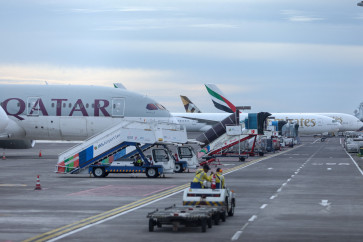Popular Reads
Top Results
Can't find what you're looking for?
View all search resultsPopular Reads
Top Results
Can't find what you're looking for?
View all search resultsInsight: RI should anticipate looming US-China rivalry
Strategic rivalry among major powers, realists have long argued, is a “law of nature” in international relations
Change text size
Gift Premium Articles
to Anyone
S
trategic rivalry among major powers, realists have long argued, is a “law of nature” in international relations. They may try to avoid such a fate, but the anarchical nature of international politics will eventually force them to engage in a struggle for supremacy. The reason realists say is that great powers will always try to attain a hegemonic position as a means to ensure their security and survival. In other words, realists believe great powers compete because that is just what they do.
Despite all the attempts at promoting cooperative security through various multilateral processes, there are now fears in the region that East Asia may be unable to escape such a realist prognosis. We in the region, especially within ASEAN circles, have worked very hard to ensure that strategic rivalry among major powers would not become a reality.
We have also tried to convince ourselves and others that ASEAN-centered institutions — such as the ASEAN Regional Forum (ARF), the ASEAN Defense Ministers Meeting Plus (ADMM-Plus), the East Asia Summit (EAS) — serve as the best forums for dialogue. And, we hope that the habit of engaging in dialogue would eventually lead to the establishment of the habit of cooperation among major powers.
However, recent developments in Sino-US relations give us a reason to worry about the future of East Asia. The two major powers seem to be on a path toward strategic rivalry, competing for influence. The US, for example, has begun to undertake several initiatives to deepen its alliance system and military presence in the region. China’s policy toward the region has also heightened the sense that it too is seeking to expand its power projection and influence.
Over the past few years, we have all tried to convince ourselves by believing that Sino-US relations would become more cooperative rather than competitive. The fact that both major powers are so interdependent economically is often cited to support this argument and logic. Here, we often ignore the fact that Sino-US relations can simultaneously be competitive strategically and cooperative economically.
Indonesia should start thinking very hard about how to position itself in such a complex relationship between the US and China. Obviously, leaning to one side is not an option. Indonesia needs and wants both the US and China as friends and partners. For that reason, we would not be happy to see our friends become rivals, competing for influence in our neighborhood.
Indonesia is still of the view that Southeast Asia should be free from any competition among extra-regional powers. We do not wish to see Southeast Asia to become, once again, a theater for great powers’ power games. That was the reason why we, in the mid-1970s, supported the idea of a Zone of Peace, Freedom and Neutrality (ZOPFAN). That is also the reason why we have time and again stressed the importance of ASEAN consolidating itself.
Now, as strategic rivalry between the US and China in the region looms large, we can no longer take it for granted that ASEAN will be able to act as a moderating factor. In fact, a Sino-US strategic rivalry has the potential to polarize ASEAN, turning the region once again into a theater for the pursuit of primacy among major powers. For example, differing responses from ASEAN member state to the US’ decision to station its Marines in Darwin, Australia, would highlight once again differences in strategic perceptions of individual member states.
So, what should Indonesia do? First, we should stop pretending that a Sino-US strategic rivalry is unlikely. It is not. Even voices within China, as recently reflected in the editorial of China’s Global Times, believe that “in other countries in Central Asia and Southeast Asia, the contest between the two powers is far from settled” (Nov. 30).
Second, we should stop pretending that the ASEAN-centered multilateral processes are well equipped to address this challenge on their own. They are not. For ASEAN’s normative multilateral framework to function well there is the need for a stable balance of power among the major powers. Hence, a “dynamic equilibrium” within an ASEAN’s multilateral framework — such as the EAS — requires a stable conventional balance of power outside that framework.
The future stability in East Asia requires both an ASEAN-driven multilateral framework and conventional balance of power among the major powers. Indonesia should not pretend that the former can replace the latter. The key challenge for Indonesia, therefore, is how to create and ensure ketahanan regional (regional resilience) by continuously calling for, and work toward, the unity and consolidation of ASEAN.
Only a united and consolidated ASEAN could prevent Southeast Asia from becoming a theater for major-power rivalry. As such, Indonesia and other ASEAN countries should start thinking about the need for some sort of ZOPFAN II as a new platform to address the challenge posed by a Sino-US strategic rivalry.
The writer is the executive director of the Centre for Strategic and International Studies (CSIS) in Jakarta.










